In the world of economics, there stands an extraordinary scholar who, despite being in his eighties, remains vibrant and passionate. He is Prof Lawrence Juen-yee Lau—an internationally renowned economist, former vice chancellor of the Chinese University of Hong Kong, and recipient of an honorary doctorate from the University of Macau (UM). Prof Lau was awarded a Doctor of Education honoris causa by UM in 2020 and was invited to deliver a talk at the university in 2025. We took this rare occasion to capture the wisdom of this eminent scholar in a 45-minute interview just before he took the stage for his talk.
From renowned economist to pioneer of collaborative education in the Greater Bay Area
‘Hi, I’m Lawrence Lau,’ he says with a smile. Dressed in a neat suit, Prof Lau arrives punctually for our interview. His humble, polite, and sincere manner immediately catches our attention.
Prof Lau’s first name in Chinese is derived from his birthplace, Zunyi in Guizhou province. ‘It was a coincidence,’ he explains. ‘My parents were passing through Zunyi during the Second Sino-Japanese War when I was born. I was still an infant by the time we arrived in Chongqing. We returned to Hong Kong in 1946, when I was about two years old.’ After completing his secondary education in Hong Kong with excellent grades, Lau was admitted to Stanford University in 1961. Initially an engineering student, ‘I switched to physics when I found engineering too rigid,’ says Prof Lau, who eventually settled on economics for his postgraduate studies. ‘The flexible approach to education at universities in the United States allowed me to change my field of study easily. On the other hand, knowledge is interconnected,’ he explains. ‘Economics and physics share common languages and concepts. For example, equilibrium is a key concept in both mechanics and the law of supply and demand in economics.’
Prof Lau joined the Stanford University Department of Economics in 1966, where his research focused on economic development, economic growth, and the economies of East Asia (including mainland China). During his tenure at Stanford, he also held several positions, including co-director of the Walter H. Shorenstein Asia-Pacific Research Center and director of the Stanford Institute for Economic Policy Research. In 2004, Prof Lau assumed the position of vice chancellor of the Chinese University of Hong Kong (CUHK), a new role he embraced with remarkable courage and determination. ‘I believe I made the right decision,’ he says. As Prof Lau recalls, he achieved most of his goals during his six-year tenure at CUHK, one of which was to promote the establishment of the Chinese University of Hong Kong (Shenzhen).
Prof Lau’s vision of creating a world-class university in Hong Kong led him to seek innovative solutions. ‘I questioned whether it would be possible with the resources available in Hong Kong alone, given that there were already three comprehensive research universities in the city,’ he says. Prof Lau then facilitated a partnership between CUHK and the Shenzhen Municipal Government. In 2009, the two parties signed an agreement to jointly establish CUHK (Shenzhen), marking the first step in cross-border educational collaboration between Hong Kong and Shenzhen.
The beginning is always the hardest. Prof Lau candidly admits that the biggest difficulty at the time was to break the traditional mindset of ‘keeping resources and money in the local community’ in both places. Fortunately, all parties were able to overcome this barrier by taking a macro view of the integrated development of the Guangdong-Hong Kong-Macao Greater Bay Area. In 2014, CUHK (Shenzhen) was officially inaugurated. ‘The university is doing very well,’ adds Prof Lau. The flourishing development of CUHK (Shenzhen) is also a testament to Prof Lau’s forward-looking vision for educational cooperation in the Greater Bay Area.
Deep Connection with UM
As a renowned economist, Prof Lau has a busy schedule, yet he readily agreed to an interview request from My UM. He lights up when talking about his connection with UM.
‘I had visited Macao and UM many times even before UM awarded me a Doctor of Education honoris causa in 2020,’ says Prof Lau. In 2005, he accepted an invitation from Huen Wing Ming, a member of UM’s University Council, to assist in establishing Dr. Stanley Ho Medical Development Foundation (SHMDF) in Macao. The foundation, in partnership with the Faculty of Medicine of CUHK, provides training for doctors in Macao and supports medical education. Though medicine is not his expertise, Prof Lau has always supported the work of the foundation. He believes in its mission to cultivate excellent medical professionals and improve local healthcare services. In 2021, in celebration of the 40th anniversary of UM, SHMDF established the ‘Dr. Stanley Ho Medical Development Foundation “Set Sail for New Horizons, Create the Future” Grant’. The scheme, which grants research funding of MOP 1 million per year for 10 years, aims to support young scholars to venture into innovative research. Prof Lau expressed his deep satisfaction with this initiative.
With his ties to Macao rooted in medicine, Prof Lau was exceptionally supportive when he learned that UM will be setting up a medical school on its campus in the Guangdong-Macao In-Depth Cooperation Zone in Hengqin. ‘This is very much in line with the mission of SHMDF. I have always supported the establishment of Macao’s own medical school. Macao should have the ability to produce and train local doctors. That way, local hospitals won’t have to recruit medical professionals here and there. This will also help build a healthcare system in the city,’ he says.
In addition to UM’s aspiration to produce healthcare professionals, Prof Lau appreciates the university’s commitment to postgraduate education. As the highest educational level, postgraduate education carries the important mission of cultivating top-tier innovative talent. Therefore, it is of paramount importance to accelerate the development of high-quality postgraduate education. Prof Lau points out that in prestigious universities in mainland China, postgraduate students often outnumber undergraduate students. The same is true in the best universities in the United States, where undergraduates do not make up the majority of students. He believes that world-class universities should focus on enhancing postgraduate education and step up efforts to cultivate high-calibre talent.
Prof Lau also cares about Macao’s economic development. He advocates the diversification of the city’s economy, adding that Macao should capitalise on its unique strength as a platform for commercial and trade cooperation and as a bridge for cultural exchanges between China and Portuguese-speaking countries. ‘Macao’s greatest advantage is its ties with Portuguese-speaking countries,’ he explains. ‘These countries have a combined population of over 200 million people, and the potential for Macao to partner with them is immense. On the other hand, China now plays a pivotal role in the global economy and the eyes of the world are on its development. Macao is therefore an ideal destination for people from Portuguese-speaking countries who want to know more about China and learn the Chinese language, and UM is very attractive to students from these countries.’
Prof Lau’s confidence in UM’s future is palpable. ‘UM is truly one-of-a-kind,’ he says. In Prof Lau’s view, UM stands out as it is the oldest and most comprehensive public university in Macao, with the strongest academic strengths in the city. ‘The university also has abundant resources,’ adds Prof Lau, whose optimism stems from the Macao SAR Government’s substantial investment in and support for higher education development. He believes that UM will have tremendous development opportunities, and envisions the university playing a crucial role in cultivating talent for the Greater Bay Area and building China into a leading country in education.
‘The sky won’t fall’
UM has invited Prof Lau to speak on campus on three occasions. In 2009, he attended the International Conference on Economic Integration in the Greater China Region jointly organised by UM and the Chinese Economists Society. He discussed the sources of economic growth in the Greater China Region alongside eminent scholars such as the late Sir James Mirrlees, winner of the Nobel Memorial Prize in Economic Sciences, and Mark Rosenzweig, Frank Altschul Professor of International Economics at Yale University. In 2019, Prof Lau gave a talk titled ‘The China-US Trade War: Challenges and Opportunities for China, the Greater Bay Area and Macao’, in which he analysed the short- and long-term pros and cons of the trade war and offered many insights. This year, in 2025, he delivered a talk on ‘China in the Global Economy’ to discuss China’s role in the current global economic landscape, which attracted a full house.
Prof Lau’s keen interest in China’s economy can be traced back to the moment he became fascinated by the discipline of economics. He received his master’s degree in economics from the University of California, Berkeley in 1966. That same year, he developed the world’s first econometric model of China, which he has continued to enrich and refine over the years.
In 1979, China, in its early stages of reform and opening-up, welcomed a delegation of economists from the United States for the first time since the founding of the People’s Republic of China. Among the ten-member delegation from the American Economic Association was Prof Lau, who was making his first visit to mainland China as an adult. The delegation also included renowned economists such as Kenneth Joseph Arrow, winner of the 1976 Nobel Memorial Prize in Economic Sciences. ‘After spending about two weeks in China, the ten of us met in Tokyo to forecast China’s economic development,’ Prof Lau recalls. Using the model he had developed, Prof Lau predicted an economic growth rate of 8%, the highest among his peers. His prediction has proved accurate—China’s average annual economic growth has been around 9% since 1980.
Despite an increasingly complex global environment and domestic challenges, Prof Lau remains optimistic about China’s economic development. He refers to the Chinese title of his 2018 book, The China-US Trade War and Future Economic Relations—‘天塌不下來’, which literally means ‘the sky won’t fall’—and stresses that there is no need to panic. Prof Lau’s confidence comes from the excellent ‘expectation management’ of successive Chinese leaders’.
Prof Lau vividly recalls some critical moments in the history of the global economy and the responses of Chinese leaders: Deng Xiaoping’s emphasis on ‘development as the absolute principle’ in his southern tour during the slowdown of China’s reform and opening-up in 1992; former Premier Zhu Rongji’s policy of maintaining a stable RMB exchange rate during the Asian financial crisis in 1997; and former Premier Wen Jiabao’s 4 trillion yuan stimulus package during the global financial crisis in 2008. All these measures succeeded in boosting confidence, reversing pessimistic expectations for China’s economic growth, and spurring the economy. Prof Lau believes that the law of supply and demand still applies to the current situation. He claims that there is excess production capacity in mainland China and the current problem is insufficient demand. Demand can be stimulated as long as the central government takes greater steps to support economic development and change public expectations. ‘China’s economy can maintain a growth rate of 5% to 6% over the next decade,’ he concludes.
After the interview, Prof Lau gave a talk on ‘China in the Global Economy’ at the UM Guest House, sharing his insights along with data and real-life case studies. The talk was well attended by hundreds of UM faculty and students and sparked a lively discussion. Some scholars even took the opportunity to ask Prof Lau to autograph copies of his latest book, Is the Chinese Economy a Miracle or a Bubble?. In addition, Prof Lau revealed an upcoming project: ‘I will be publishing a new book this year.’ So UM members, stay tuned for Prof Lau’s new book!
Text: Gigi Fan
Photos: Jack Ho, with some provided by SHMDF
English translation: Winky Kuan
Video: Hasen Cai & David Tong, UM Reporter Xiong Siyao
Source: My UM Issue 141
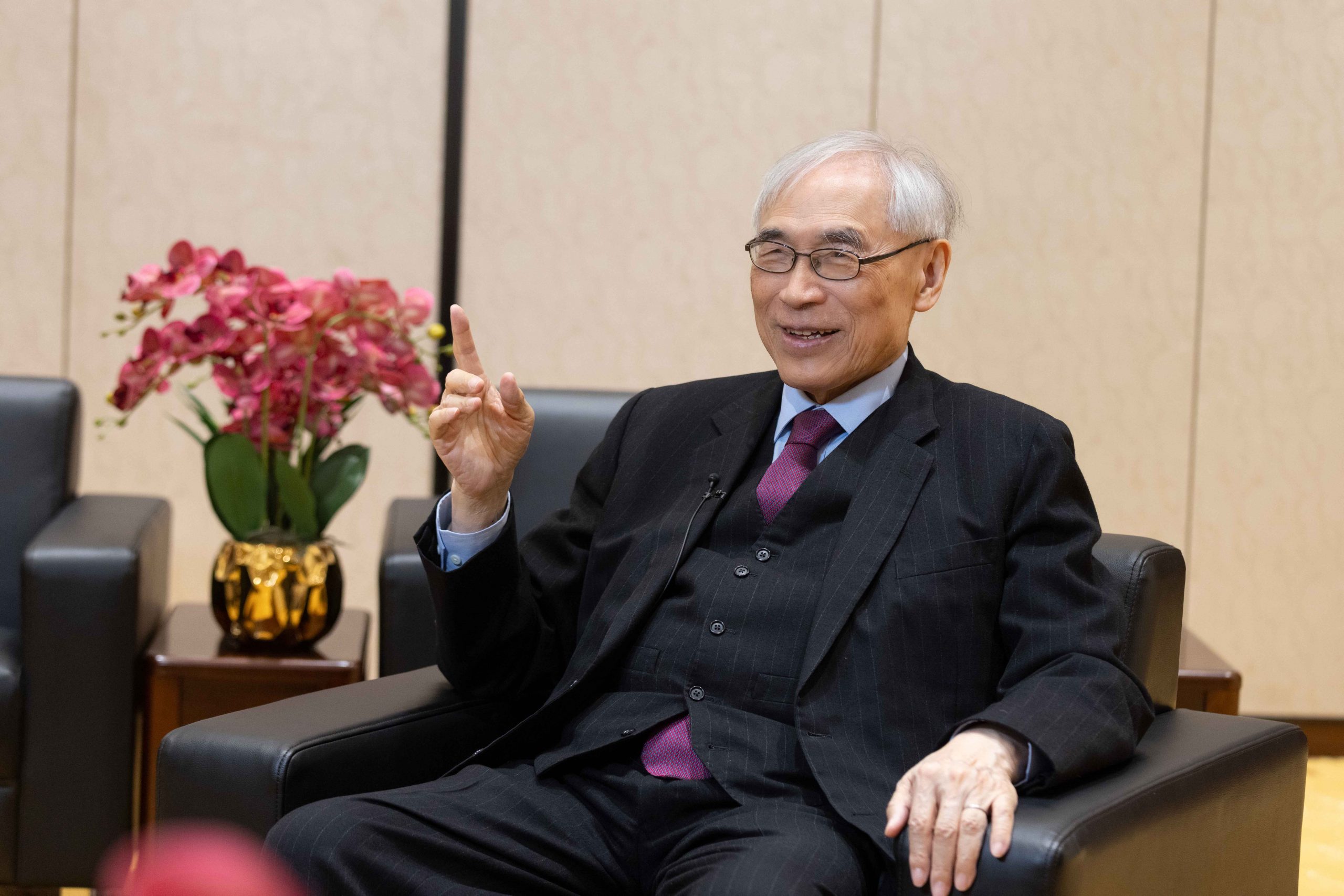
Prof Lawrence Juen-yee Lau
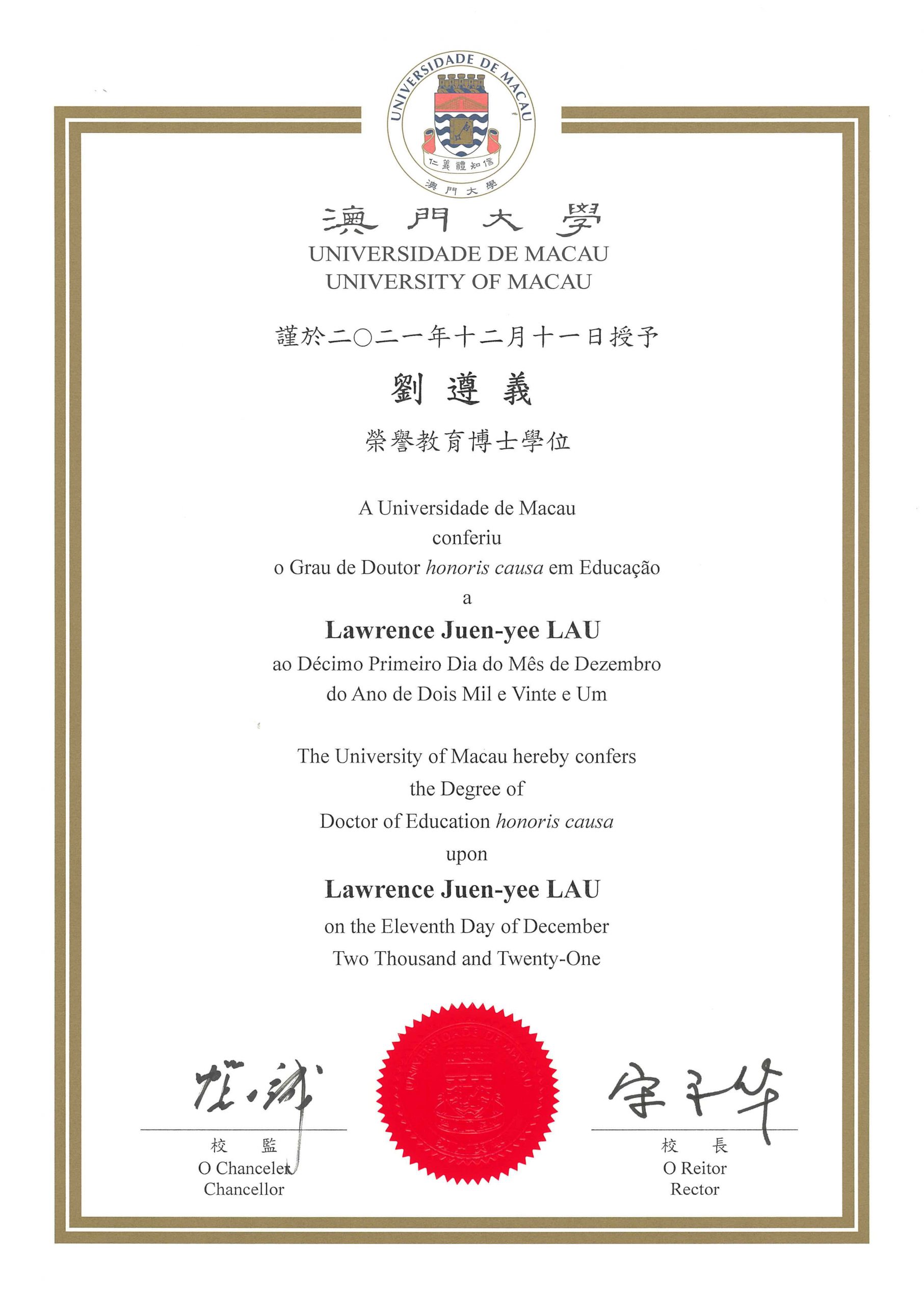
Prof Lau receives a Doctor of Education honoris causa from UM

In May 2019, Prof Lau gave a talk on the China-US trade war at UM
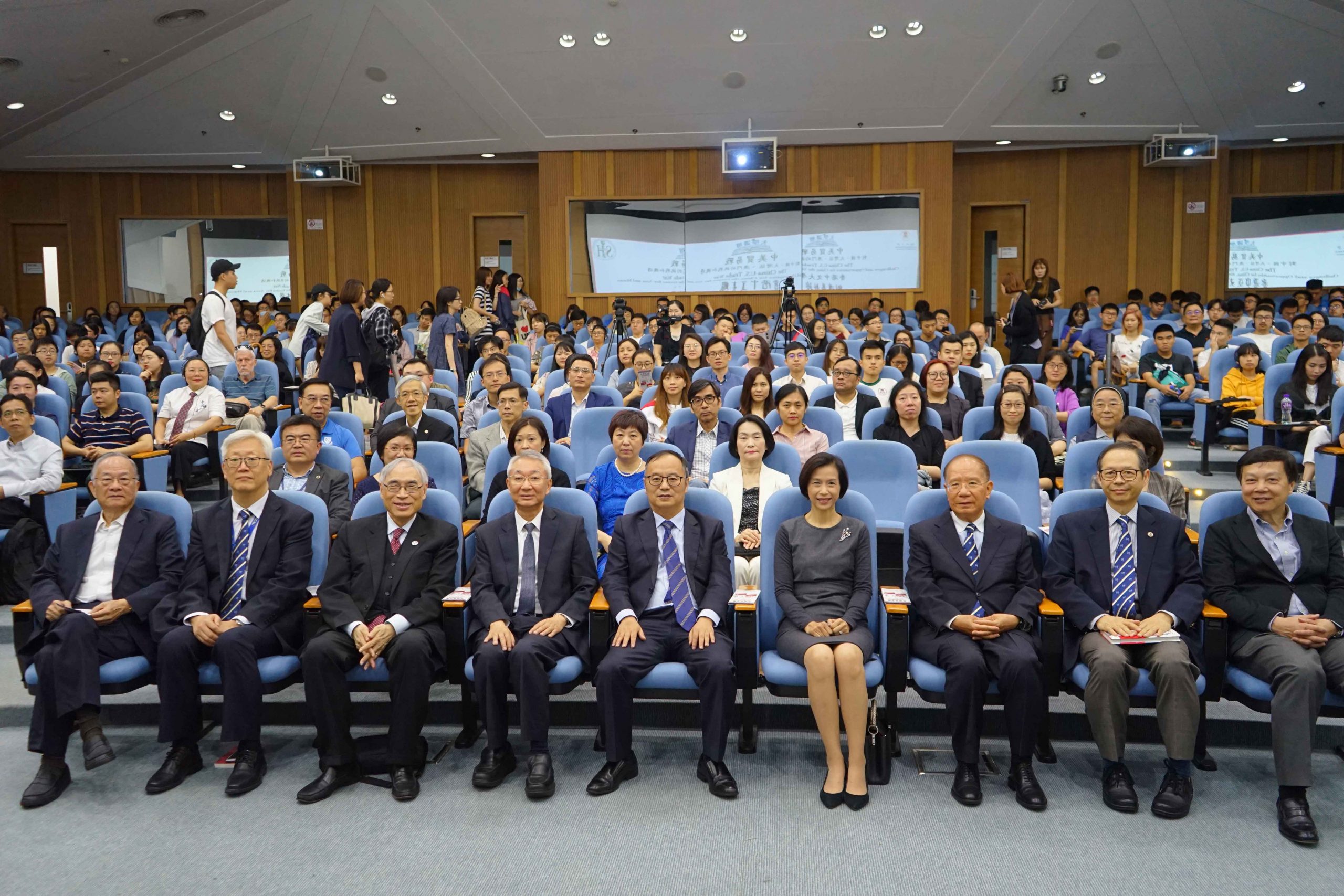
Members of UM’s University Council and university management attend Prof Lau’s talk

In early 2025, Prof Lau delivered a talk on ‘China in the Global Economy’ at UM
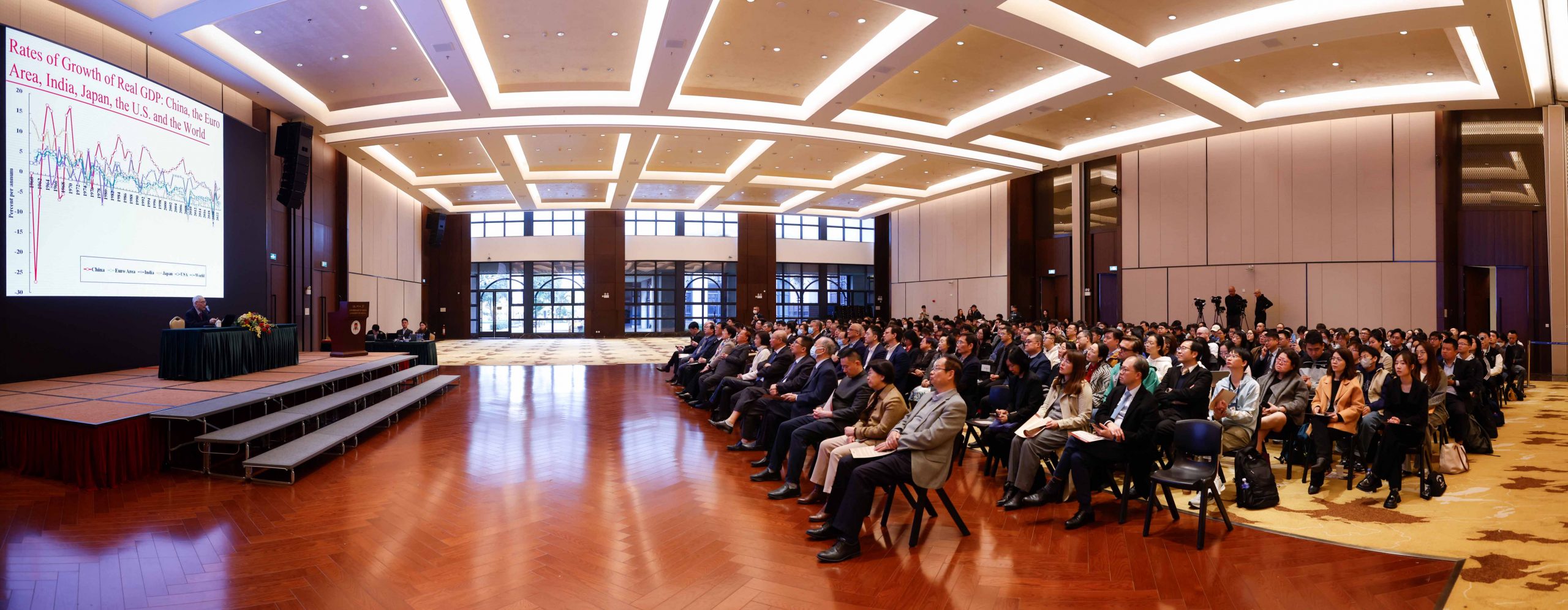
Prof Lau’s UM Doctor honoris causa Lecture attracts a full house
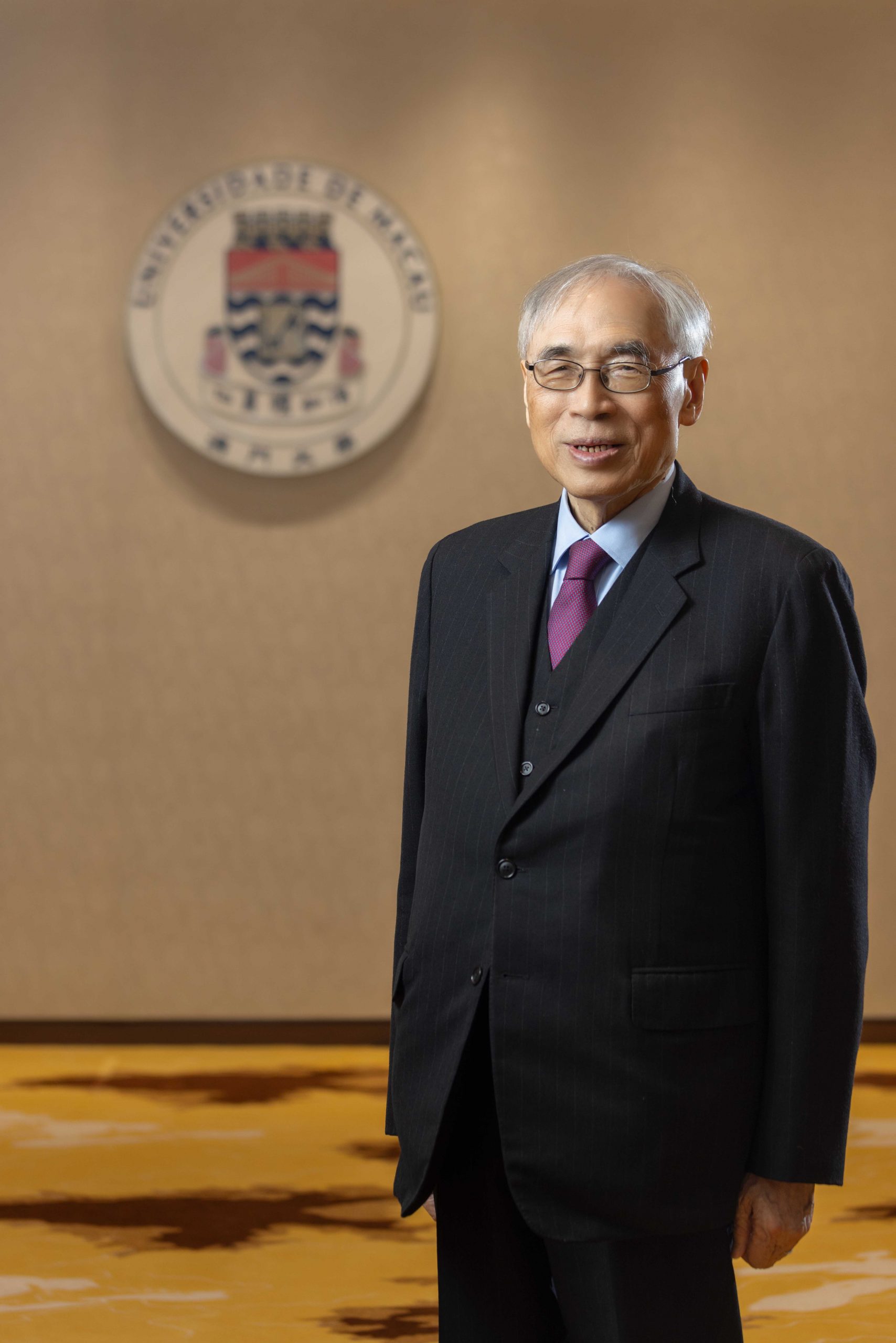
Prof Lau has strong ties with UM
與澳門因醫學結緣.jpg)
Prof Lau’s (front row, third from right) connection with UM is rooted in medicine
